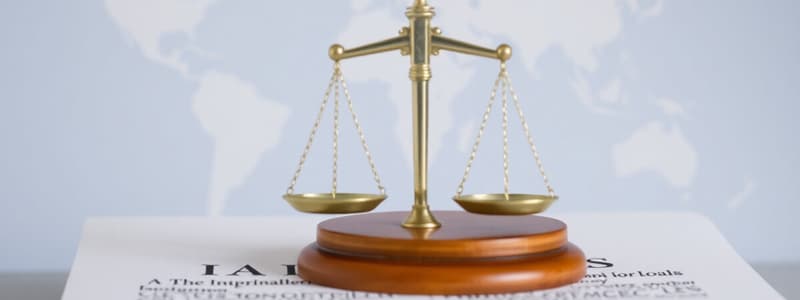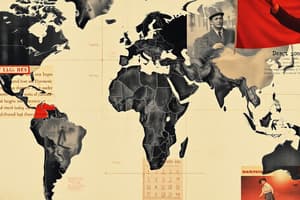Podcast
Questions and Answers
What is one of the primary formal sources of international law?
What is one of the primary formal sources of international law?
- Opinio juris (correct)
- Scholarly writing
- Judicial decisions
- State Practice
Which of the following accurately describes customary international law (CIL)?
Which of the following accurately describes customary international law (CIL)?
- It is created solely through treaties.
- It requires a significant number of states to be effective. (correct)
- It is specifically defined and easy to prove.
- It requires only a single state to establish.
What is a disadvantage of customary international law (CIL)?
What is a disadvantage of customary international law (CIL)?
- It can be specific and easily interpreted.
- It is established through scholarly writing.
- It is universally accepted without exception.
- It is often not specific and difficult to prove. (correct)
Which of the following is not considered a primary formal source of international law?
Which of the following is not considered a primary formal source of international law?
Which of the following is NOT a source of international law?
Which of the following is NOT a source of international law?
What does the principle 'nullum crimen sine lege' imply in international law?
What does the principle 'nullum crimen sine lege' imply in international law?
What are general principles in the context of international law?
What are general principles in the context of international law?
Which of the following statements about material sources of international law is true?
Which of the following statements about material sources of international law is true?
According to Article 38 of the ICJ Statute, which of the following is NOT mentioned as a source of law?
According to Article 38 of the ICJ Statute, which of the following is NOT mentioned as a source of law?
Which element contributes to the creation of customary international law?
Which element contributes to the creation of customary international law?
What is required for customary international law to be established?
What is required for customary international law to be established?
Which of the following statements about customary international law is TRUE?
Which of the following statements about customary international law is TRUE?
Which of the following is classified as a secondary formal source of international law?
Which of the following is classified as a secondary formal source of international law?
What does jus cogens refer to in international law?
What does jus cogens refer to in international law?
What distinguishes customary international law from written treaties?
What distinguishes customary international law from written treaties?
What is the significance of 'soft law' in the context of international law?
What is the significance of 'soft law' in the context of international law?
What is required for state practice to be considered extensive and virtually uniform in relation to opinio juris?
What is required for state practice to be considered extensive and virtually uniform in relation to opinio juris?
In the context of customary international law (CIL), who is bound by the CIL regardless of consent?
In the context of customary international law (CIL), who is bound by the CIL regardless of consent?
What legal case did the ICJ consider regarding the delimitation of the continental shelf in the North Sea?
What legal case did the ICJ consider regarding the delimitation of the continental shelf in the North Sea?
What does the term 'opinio juris' refer to in international law?
What does the term 'opinio juris' refer to in international law?
What is the significance of a persistent objector in customary international law?
What is the significance of a persistent objector in customary international law?
What is the primary motive for state practice to be recognized as customary international law?
What is the primary motive for state practice to be recognized as customary international law?
During the North Sea Continental Shelf cases, what did the Court assess to understand opinio juris?
During the North Sea Continental Shelf cases, what did the Court assess to understand opinio juris?
Which of the following is NOT a factor typically associated with demonstrating opinio juris?
Which of the following is NOT a factor typically associated with demonstrating opinio juris?
Flashcards
Permissive system
Permissive system
A legal system where the absence of a specific law does not mean something is allowed. It means the state can only exercise its power within the bounds of clear legal rules.
Nullum crimen sine lege
Nullum crimen sine lege
Latin for "No crime without law."
Lotus Case
Lotus Case
The legal principle that states a nation can only act within the boundaries of existing international law.
Treaties
Treaties
Signup and view all the flashcards
Customary international law
Customary international law
Signup and view all the flashcards
General Principles of law
General Principles of law
Signup and view all the flashcards
Formal Sources of International Law
Formal Sources of International Law
Signup and view all the flashcards
Material Sources of International Law
Material Sources of International Law
Signup and view all the flashcards
Judicial decisions
Judicial decisions
Signup and view all the flashcards
Soft law
Soft law
Signup and view all the flashcards
Customary International Law (CIL)
Customary International Law (CIL)
Signup and view all the flashcards
General Principles
General Principles
Signup and view all the flashcards
Persistent Objectors
Persistent Objectors
Signup and view all the flashcards
Opinio Juris
Opinio Juris
Signup and view all the flashcards
Jus Cogens
Jus Cogens
Signup and view all the flashcards
State Practice
State Practice
Signup and view all the flashcards
Binding Nature of CIL
Binding Nature of CIL
Signup and view all the flashcards
North Sea Continental Shelf Cases
North Sea Continental Shelf Cases
Signup and view all the flashcards
Motivated by Legal Duty
Motivated by Legal Duty
Signup and view all the flashcards
Extensive and Uniform State Practice
Extensive and Uniform State Practice
Signup and view all the flashcards
Not Bound by CIL
Not Bound by CIL
Signup and view all the flashcards
Study Notes
Public International Law - Sources
- Permissive System: International law operates on a permissive principle, meaning actions are not prohibited unless explicitly forbidden. This is embodied in the Lotus case and the principle nullum crimen sine lege (no crime without law).
Sources of International Law
-
Domestic Law Sources: Include constitution, legislation, civil codes, executive branch enforcement mechanisms (police, judiciary), and sovereignty.
-
International Law Sources: Include treaties, customary international law, general principles of law, judicial decisions, scholarly writing, soft law, and jus cogens.
Sources - Article 38 ICJ Statute (International Court of Justice)
- Treaties: Establish rules explicitly recognized by contesting states.
- Custom: Evidence of general practice accepted as law (consistent and uniform state practice with opinio juris—a sense of legal obligation).
- General Principles: Fundamental legal principles recognized by most legal systems.
- Judicial Decisions and Scholarship: Subordinate sources used to determine rules.
Customary International Law
- Nature: Unwritten rules or customs that states adhere to.
- Formation: Habit of consistent pattern of state practice → tradition, expectation → legal obligation.
- Example: The North Sea Continental Shelf cases highlight State practice and opinio juris in determining customary international law.
Customary International Law (Art. 38(1)(b) ICJ Statute)
- State Practice: Behavior of states must be general, widespread, settled, and consistent.
- Opinio juris: State activity driven by a belief that the practice is legally required, often demonstrated via statements, correspondence, or UNGA votes.
Binding Customary International Law
- Persistent Objector Rule: A state that persistently objects to the development of a customary international law is not bound by it, but this requires clear, sustained objection.
Sources of International Law: Summary
- Primary Formal Sources: Treaties, custom, general principles, (jus cogens).
- Primary Material Sources: State practice, opinio juris, judicial decisions (less authoritative).
- Secondary Material Sources: Scholarly writing.
- Formal Sources: Recognized methods of creating international law.
- Material Sources: Underpinning factors influencing international law.
General Principles of Law
- Nature: Fundamental legal principles recognized across legal systems.
- Role: Used when specific treaty or customary law isn't applicable. They often relate to issues like due diligence, accountability and are a supplementary role—derived from judicial decisions or scholarship.
- Example: The Corfu Channel case illustrates the application of a general principle of due diligence (obligation to exercise reasonable care and address harms to other states).
Summary of Custom
- States adhere to consistent practice: Often due to a sense of legal obligation.
- Widespread and repeated practice: By significant numbers of states over lengthy time frames.
- Disadvantages: Can be challenging to prove. Often not specific.
Studying That Suits You
Use AI to generate personalized quizzes and flashcards to suit your learning preferences.




